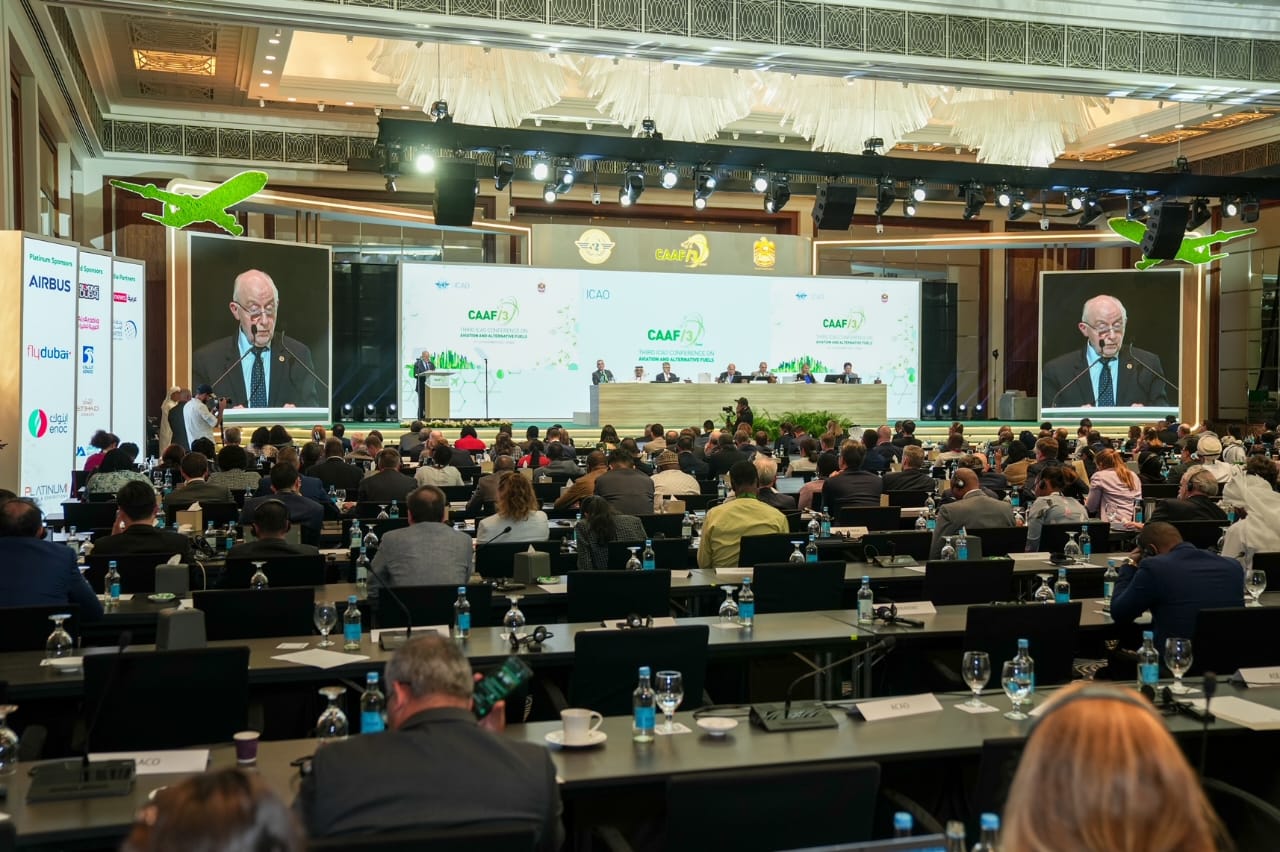The International Civil Aviation Organisation (ICAO) announced on Friday the adoption of (Dubai Framework) a new ICAO Global Framework for Sustainable Aviation Fuels (SAF), Lower Carbon Aviation Fuels (LCAF) and other Aviation Cleaner Energies, during the last day of the Third ICAO Conference on Aviation and Alternative Fuels (CAAF/3), held in Dubai. The agreement, which was reached in Dubai, comes a few days ahead of the UN Climate Change Conference (COP28).
As per the framework, ICAO and its member states have agreed to strive to achieve a collective global aspirational vision to reduce CO2 emissions in international aviation by 5 percent by 2030, compared to zero cleaner energy use, by expanding the production of SAF, LCAF and other cleaner aviation energy sources, supported by lowering production costs and providing financing and technology.
ICAO members also agreed to review these goals by 2028, through the study and evaluation of developments in the global sustainable energy market.
The Global Framework was adopted following consultations made across 5 days, with inputs from over 1,000 officials, investors and experts from 100 countries and 30 international organisations.
Key elements of the Framework include a collective Vision for the clean energy transition, harmonised regulatory foundations, supporting implementation initiatives, and improved access to financing for related initiatives so that “No Country is Left Behind.”
Abdullah bin Touq Al Marri, Minister of Economy, said that (Dubai framework) is a major turning point in the fields of aviation and sustainable and clean fuel production, ushering in a more sustainable future. It will also encourage investments in clean aviation energy, generating fresh investment and economic opportunities, Bin Touq added, noting that the adoption of the new framework provides impetus to global climate action efforts, especially with COP28 a few days away.
ICAO Council President Salvatore Sciacchitano said that the adoption of the Global SAF and LCAF Framework (Dubai Framework) is a historic stride towards strengthening global climate action, sending a strong and unified message to investors around the world about the urgency of investing in clean aviation energy.
The ICAO Global Framework for SAF, LCAF and other Aviation Cleaner Energies, Shakitano further explained, complements ICAO's drive to implement the International Aviation Carbon Offset and Reduction Scheme for International Aviation (CORSIA), while also providing a conducive climate for investment in sustainable fuel and expanding its production and financing activities.
Villiam Gavoka, President of CAAF/3 and Deputy Prime Minister and Minister of Tourism and Civil Aviation of Fiji, said that the global framework is a major and crucial step forward in reducing carbon emissions in the global aviation sector, adding that it will stimulate investment in sustainable fuel production, as it provides investors with insights into volume and nature of the demand for sustainable aviation fuel.
For his part, Saif Mohammed Al Suwaidi, Director-General of the General Civil Aviation Authority (GCAA), affirmed that the global aviation sector is entering a chapter in its transition towards more sustainable models.
Al Suwaidi explained that the (Dubai framework) serves as a cornerstone of international cooperation in this field, supports the global developmental agenda and accelerates the world's journey towards its ‘net zero by 2050’ target.
Juan Carlos Salazar, ICAO Secretary-General, commented, “We are proud to be a part of this landmark agreement, which acts as a testament to the commitment of the global aviation sector to making a transitional shift and future-proofing our industry, while also boosting the sector's contributions to Global Development Goals in terms of achieving carbon neutrality and driving sustainable growth model. The Global Framework for SAF, LCAF and other Aviation Cleaner Energies provides a clear roadmap to achieve these goals."
As per the framework, the ICAO and its member states will work towards the decentralisation of the production of SAF, LCAF and other aviation cleaner energies across all countries and regions, providing a fair and equal opportunity to participate across the value chain, from feedstock to fuel production and use. The framework states that “no single fuel source will be produced at a level necessary to achieve the long-term global aspirational goal (LTAG). Accordingly, the global framework needs to be flexible and not exclude any particular fuel source, pathway, feedstock or technology that meets the CORSIA agreed criteria”.
SAFs, LCAFs and other aviation cleaner energies are expected to have the largest contribution to aviation CO2 emissions reduction by 2050, the framework asserts, which will be supported through a comprehensive approach to be developed by the ICAO and its members, consisting of a basket of measures, including technology, sustainable fuels, operational improvements, and market-based measures.
During the CAAF/3 closing ceremony, the UAE, represented by the GCAA, presented ICAO with a sculpture dubbed the "Dubai framework-on the Global Framework for SAF, LCAF and other Aviation Cleaner Energies" to commemorate this historic agreement.
 Follow Emirates 24|7 on Google News.
Follow Emirates 24|7 on Google News.

![]() Follow Emirates 24|7 on Google News.
Follow Emirates 24|7 on Google News.